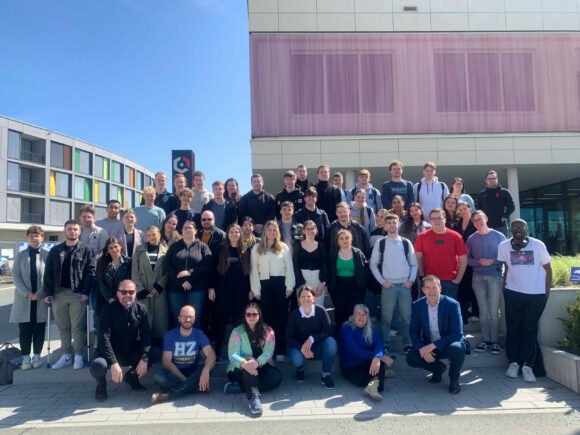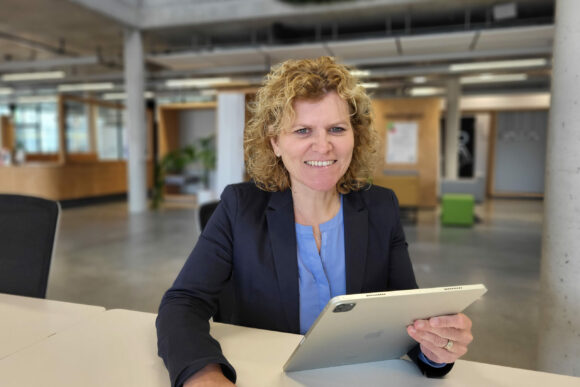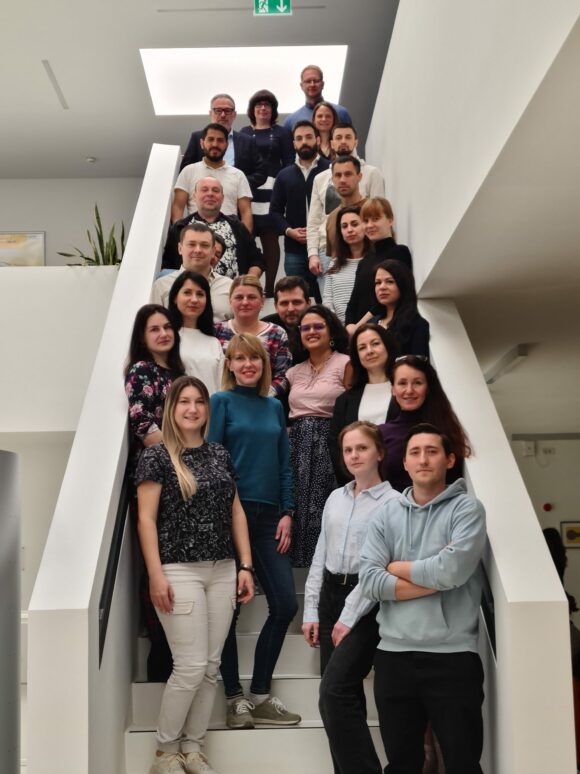Students on the Innovative Healthcare course at Hof University of Applied Sciences recently received exciting insights into key topics such as the labour market, medical technology, digitalization and IT in the healthcare sector at the Lucas Cranach Campus in Kronach. Speaker Sascha Luithardt, CIO and Head of Medical Technology at Klinikum Stuttgart, focused in particular on digitalization in the healthcare sector, but also on the changing requirements of employees in the healthcare sector.

Sascha Luithardt, who came to the Kronach campus at the personal invitation of Dean Prof. Dr. Gerald Schmola, provided many insights into the multifaceted world of Klinikum Stuttgart, the largest maximum care hospital in Baden-Württemberg with three locations, during his inspiring workshop. It alone treats around 700,000 patients per year, 600,000 of whom are outpatients. “Every day, 8,000 employees, including over 1,000 doctors, 2,700 nursing staff and almost 1,000 trainees, do their best to provide optimal care,” said Mr. Luithardt. In particular, Mr. Luithardt highlighted the hospital’s IT Service Center, which plays a central role in the provision of digital services at Klinikum Stuttgart. It employs 120 people who are responsible for over 1,000 applications, 26,000 medical technology devices and much more, processing well over 200 orders and solving IT & medical technology problems every day.
Seizing the opportunities of digitalization
Mr Luithardt emphasized that as part of the implementation of the hospital’s digital strategy, Klinikum Stuttgart is constantly working on consistently exploiting the opportunities offered by digitalization for the benefit of patients and employees. The aim is for all processes at Klinikum Stuttgart, such as patient admission and discharge, examination and treatment, as well as logistics and transport, to be “media disruption-free” and – wherever appropriate – automated. “Digital contact points are provided for optimal collaboration with the hospital’s external cooperation partners, such as referring doctors, payers and co-treaters, and the hospital is in contact with patients before and after their treatment through digital services,” said Luithardt, explaining the objective. This would enable all those involved to make informed decisions in a timely manner and arrange for appropriate, optimal treatment.
Increasing workplace satisfaction
The use of digital tools is also intended to increase the job satisfaction of employees at Klinikum Stuttgart.
“The digital services on offer give employees the freedom to concentrate better on their work with patients. The use of state-of-the-art equipment and applications and the provision of the latest digital technology in training and further education make the hospital a highly attractive employer.”
Sascha Luithardt, Head of Medical Technology at Stuttgart Hospital
During the presentation, the students were given an exclusive insight into the internal processes and challenges of a state-of-the-art healthcare provider. The conclusion:
The use of modern technologies in the healthcare sector can optimize processes, increase their efficiency and make service providers more attractive to employees. Ultimately, however, the focus must always be on improving healthcare for patients.”
Prof. Dr. Gerald Schmola, Dean
Discussion and exchange
The informative part of the workshop was followed by a lively discussion between all participants. The “world café method” provided the ideal platform for discussions on the key topics of the day. Students, lecturers and experts were able to share their views, ideas and questions in small groups. This not only promoted professional dialog, but also interdisciplinary exchange, which is crucial for future collaboration in a constantly changing healthcare sector.

Among the topics discussed were the entry opportunities for future graduates of Innovative Healthcare on the job market, as well as the demands of future employees on potential employers – in times of a cross-industry shortage of skilled workers, this is a highly exciting topic, especially for employers. Of central importance for the students: A good working atmosphere with room for effective criticism management, sound induction training for new employees and adaptable working time models.
Expectations of the hospital of the future
The hospital of the future was also the subject of lively discussion. Important points for the students: the focus must be on patients, waiting times should be reduced, appointments should be optimized and processes improved – ideally all via an app. The use of artificial intelligence should also not be missing in the hospital of the future – be it in a supportive function in diagnosis or in the assessment of urgency in the triage process.
All in all, the workshop with CIO and Head of Medical Technology at Klinikum Stuttgart Sascha Luithardt was not only an enrichment for the students, but also an example of how cooperation between educational institutions and leading institutions in the healthcare sector can lead to a win-win situation for all involved.
Such initiatives help to bridge the gap between theory and practice and lay the foundations for a promising future in the healthcare sector.”
Prof. Dr. Matthias Drossel, Head of the Innovative Healthcare course



















